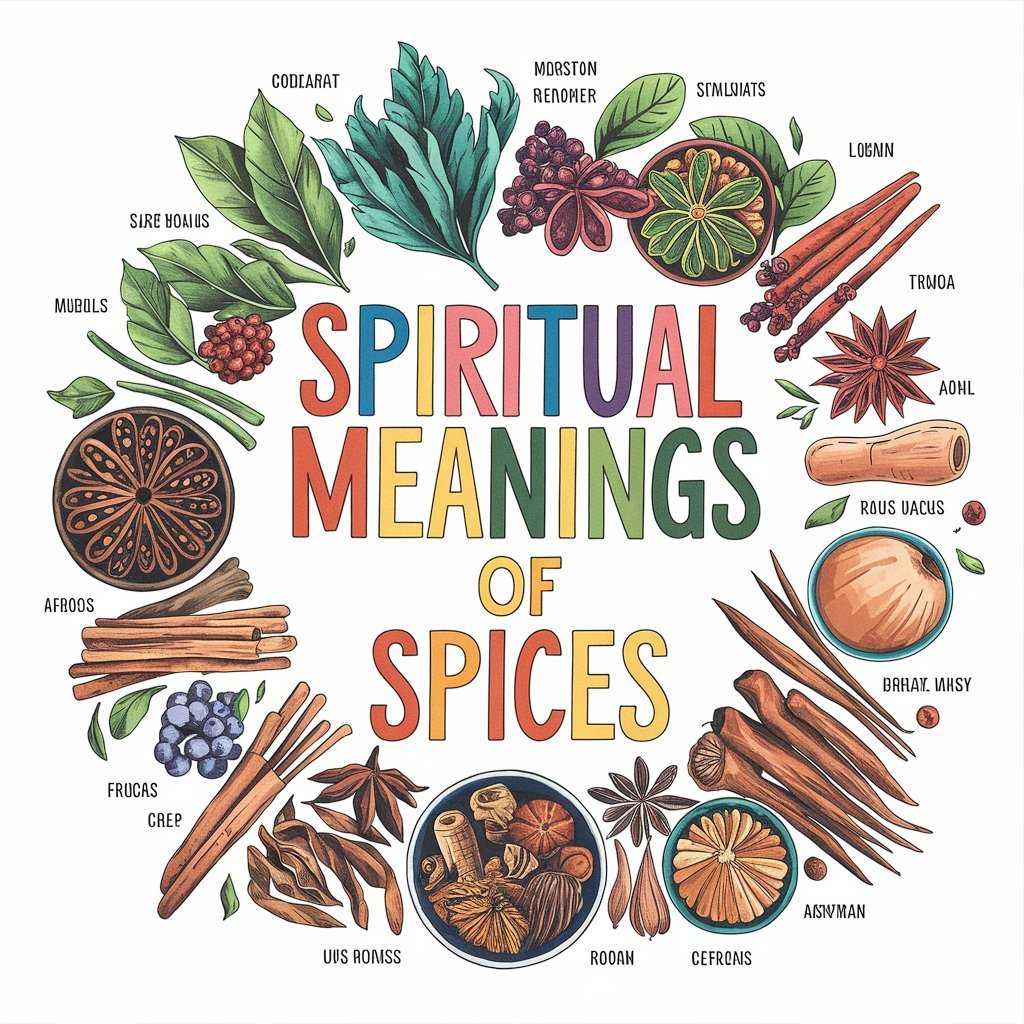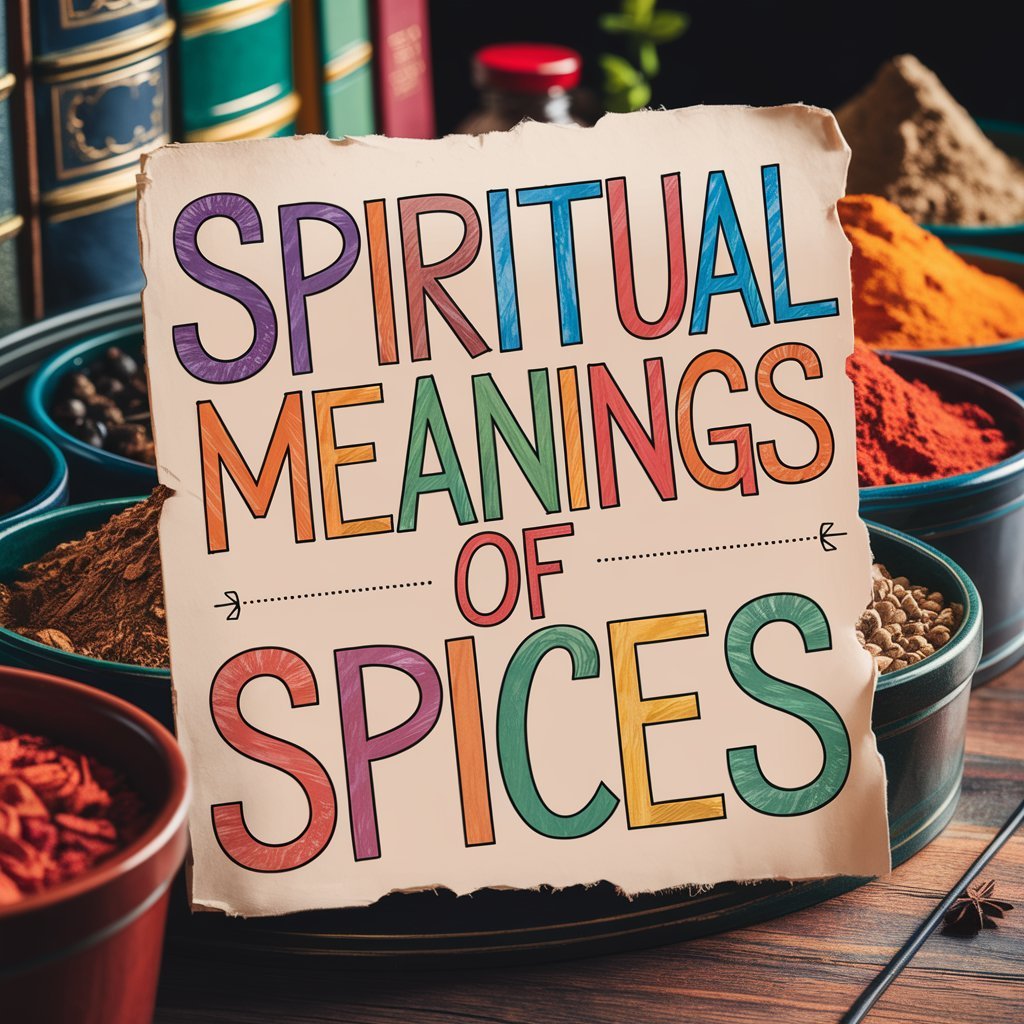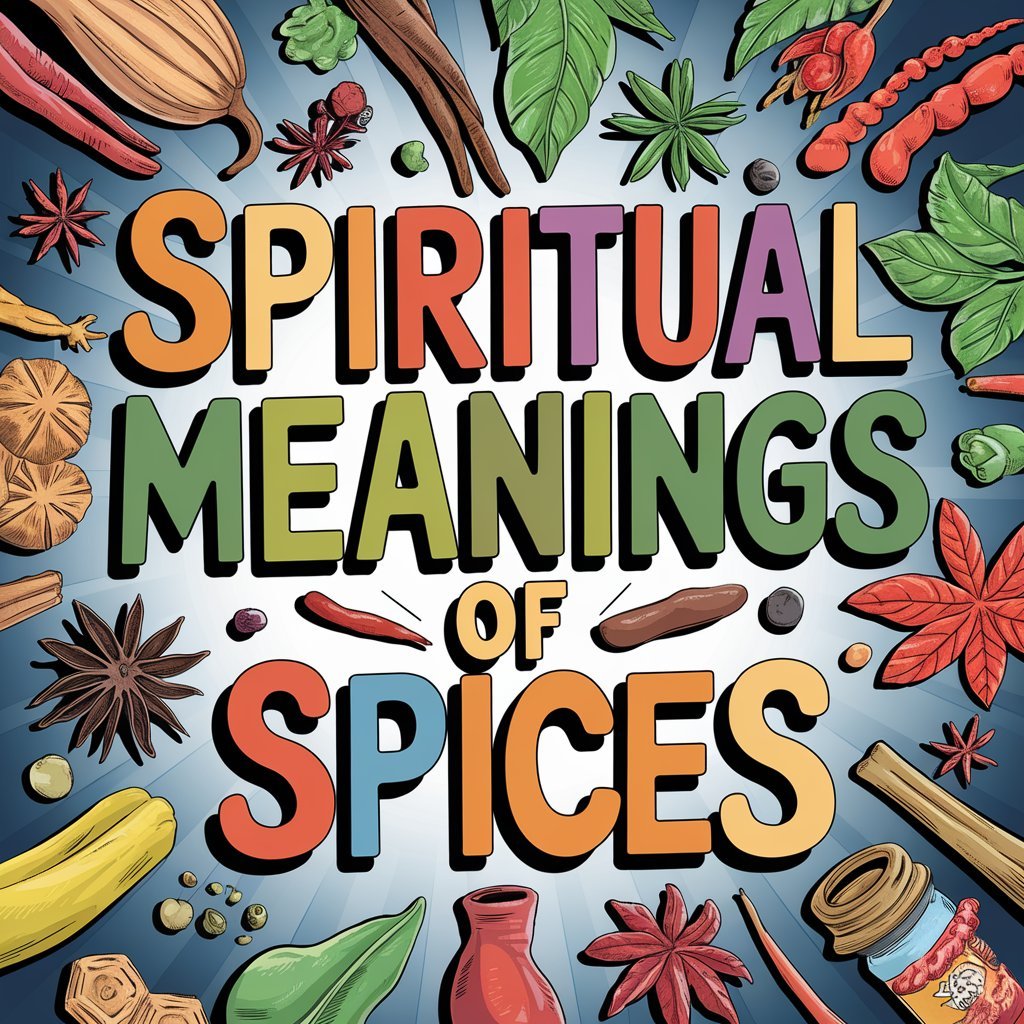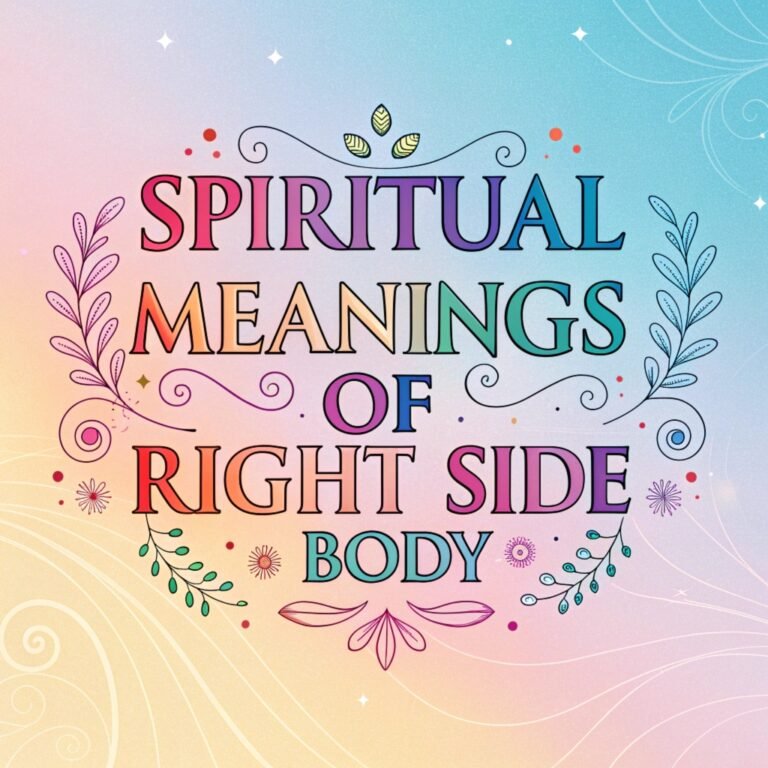14 Spiritual Meanings of Spices: Secrets Revealed
As you explore the Bible, you’ll discover that spices hold a surprising significance, symbolizing profound spiritual truths. From frankincense and myrrh, which represent prayer and worship, to cinnamon, which embodies holiness and purification, each spice has a unique role.
You might wonder, what’s the connection between hyssop and cedar, or Galilee’s salt and coriander? How did these spices figure into anointing, consecration, and sacred offerings? The answers lie in the intricate tapestry of biblical traditions, where these spices weave together to reveal a deeper understanding of faith and spirituality.
Key Takeaways
- Frankincense and myrrh symbolize prayer, worship, and sacrifice, holding profound spiritual importance in Scripture.
- Cinnamon represents holiness, purification, and consecration, evoking a sense of reverence and divine wisdom.
- Hyssop and cedar symbolize spiritual cleansing, purification, and protection, urging the removal of spiritual impurities.
- Biblical spices like frankincense, myrrh, and cinnamon were used in the Tabernacle and Temple to purify the air and cleanse the heart.
Frankincense and Myrrh in Scripture

In the sacred texts, you’ll discover that frankincense and myrrh, two of the most revered spices in ancient times, are mentioned over 70 times in Scripture, mainly in the Old sacred writings.
You’ll find that these Divine Aromas were highly valued for their spiritual significance, symbolizing prayer, worship, and sacrifice.
The Ancient Trade of these spices played a significant role in the economy of biblical times, with the Queen of Sheba traveling great distances to obtain them.
As you explore further into Scripture, you’ll realize that frankincense and myrrh weren’t just luxury items but held profound spiritual importance, representing the heart of worship and devotion.
Their frequent mention underscores their significance in the spiritual lives of ancient believers, offering you valuable insights into the biblical concept of worship and prayer.
Cinnamon’s Connection to Holiness
You’ll find that cinnamon, another prized spice in ancient times, was closely tied to the concept of holiness, its fragrance evoking a sense of reverence and purification in the sacred rituals of the Israelites.
In Scripture, cinnamon symbolism is deeply rooted in its association with God’s presence and divine wisdom.
Cinnamon was used to cleanse and purify the body and soul, preparing individuals for sacred ceremonies.
Cinnamon was a key component in incense blends, symbolizing prayer and worship rising to heaven.
Cinnamon was mixed with other spices to create sacred anointing oils, signifying consecration and divine appointment.
Cinnamon was used to perfume the Temple, creating a sacred atmosphere for worship and communion with God.
Through cinnamon rituals, the Israelites acknowledged God’s holiness and sought to draw near to Him.
Purification Through Hyssop and Cedar
As you explore into the domain of sacred purification, hyssop and cedar emerge as potent symbols of spiritual cleansing, their ancient uses and symbolic meanings intertwined to convey a powerful message of redemption and restoration.
You discover that hyssop rituals were used to purify lepers and cleanse homes, symbolizing the removal of spiritual impurities.
Meanwhile, cedar symbolism represents strength, stability, and protection, evoking the idea of a firm foundation for spiritual growth.
Together, hyssop and cedar convey the importance of spiritual purification, urging you to cleanse your heart and mind to receive God’s blessings.
The Significance of Galilee’s Salt
Explore into the ancient traditions of Galilee, where salt, a staple in the region, emerges as a potent symbol of spiritual preservation, illuminating the importance of seasoning your faith with wisdom and discernment.
In Galilee’s significance, you’ll discover that Salt’s preservation is more than just a culinary necessity; it’s a spiritual imperative.
Preserving truth: Salt represents the preservation of God’s truth in your heart, keeping it from corruption and decay.
Flavoring your walk: As you season your faith with salt, you add flavor to your spiritual walk, making it more palatable to others.
Purifying your soul: Salt’s purifying properties symbolize the cleansing of your soul, making you a vessel worthy of God’s use.
Illuminating your path: Salt’s preservation also represents the illumination of your spiritual path, guiding you through life’s challenges and uncertainties.
Anointing With Precious Oils
Frequently, in sacred rituals and ceremonies, precious oils are employed to anoint and consecrate, imbuing the recipient with divine properties that awaken spiritual potency and foster deeper connections with the divine.
When you anoint yourself with these sacred oils, you’re not just applying a physical substance – you’re inviting the essence of the divine to reside within you.
Ancient perfumery practices have long recognized the power of oil blends to elevate one’s spiritual state.
By crafting your own oil blend recipes, you can tap into the sacred symbolism of biblical spices, revealing a deeper understanding of the divine.
As you explore the mystical domain of anointing with precious oils, you’ll discover a profound sense of spiritual liberation, empowering you to walk in the light of your highest truth.
The Wisdom of Cassia and Cinnamon
In the domain of sacred spices, you’ll discover that Cassia and Cinnamon, two ancient aromatics, hold the keys to unsealing profound spiritual insights, guiding you toward a deeper understanding of the mysteries of the universe.
As you explore into the essence of Cassia and the significance of Cinnamon, you’ll uncover the hidden truths they convey.
Purification and consecration: Cassia’s essence is linked to cleansing and sanctification, reminding you of the importance of purity in your spiritual journey.
Wisdom and discernment: Cinnamon’s significance is tied to wisdom, encouraging you to seek discernment in your decisions and actions.
Healing and restoration: Both spices are associated with healing, symbolizing God’s power to restore and redeem.
Gratitude and praise: The aromas of Cassia and Cinnamon evoke feelings of thanksgiving and adoration, directing your heart toward worship and praise.
Sodom’s Bitter Herbs of Judgment

As you move from the sacred domain of Cassia and Cinnamon, you’re confronted with the stark contrast of Sodom’s bitter herbs, which embody the dark, punitive forces of judgment, awakening you to the consequences of disobedience.
These bitter herbs, like wormwood and gall, symbolize the bitter consequences of rejecting God’s laws and embracing sin.
They represent Divine retribution, a reminder that sin has consequences that can’t be ignored or escaped.
You’re forced to confront the reality of your choices, and the devastating effects they’ve on your life and relationships.
Sodom’s bitter herbs serve as a warning, urging you to turn away from sin and towards God’s love and redemption, lest you suffer the full weight of His wrath.
The Incense of Prayer and Worship
Your prayers and worship rise like a sweet incense before God, a fragrant offering that ascends heavenward, carrying your deepest longings and sincerest devotions.
As you lift your heart and voice to the Lord, you’re releasing Divine Aromas that fill the heavenly domain. These Sacred Scents are a pleasing sacrifice to God, and He delights in the sincerity of your worship.
- Fragrant Faith: Your trust in God’s goodness and love releases a sweet fragrance that honors Him.
- Sincere Surrender: Your willingness to surrender your will to God’s will creates a pleasing aroma that rises to heaven.
- Heartfelt Praise: Your genuine praise and thanksgiving release a sacred scent that fills the throne room of God.
- Humility and Repentance: Your humility and willingness to repent create a fragrance that’s precious to God, drawing you closer to His heart.
Healing Properties of Balm and Aloe
Through the ancient wisdom of Scripture, balm and aloe emerge as potent symbols of spiritual healing, their soothing properties mirroring the gentle touch of God’s redemptive power.
As you explore into the spiritual significance of these spices, you’ll discover that balm’s soothing nature calms the turbulent waters of your soul, while aloe’s gentle touch brings solace to the deep wounds of your heart.
In the midst of life’s trials, these spices remind you that God’s healing presence is always near, waiting to restore and redeem.
The Protection of Angelica and Rue
While balm and aloe calm the turbulent waters of your soul, angelica and rue stand guard, shielding you from the darkness that would seek to extinguish the light of God’s presence in your life.
These powerful spices serve as a spiritual armor, protecting you from the evil one’s schemes and machinations.
Repel negative energies: Angelica roots and rue extracts create a sacred boundary, keeping negative energies at bay and allowing God’s love to flow freely.
Illuminate darkness: These spices bring light to the darkest corners of your heart, revealing hidden fears and doubts, and empowering you to overcome them.
Strengthen faith: Angelica and rue fortify your faith, enabling you to stand firm against the winds of adversity and persecution.
Purify the heart: By cleansing your heart of impurities, these spices prepare you for a deeper, more intimate relationship with God.
Coriander’s Role in Sacred Offerings
As you prepare sacred offerings, coriander’s sweet, citrusy aroma wafts up, carrying your prayers and intentions to the heavens, where they’re received with divine favor.
In biblical times, coriander was a key ingredient in sacred rituals, symbolizing spiritual growth, renewal, and freedom from bondage.
Coriander rituals involved mixing the spice with other sacred ingredients to create a potent blend, amplifying the intentions and prayers of the faithful.
The coriander symbolism in these rituals represented the believer’s desire to break free from spiritual slavery, embracing a life of purpose and divine guidance.
As you incorporate coriander into your sacred offerings, remember its powerful symbolism, and let its fragrance carry your prayers to the heavens, where they’ll be met with divine favor and freedom.
Spices of the Tabernacle and Temple
You step into the sacred domain of the Tabernacle and Temple, where the artful blend of spices awakens your senses, transporting you to an era of profound spiritual connection and divine communion.
The sacred aromas wafting from the Tabernacle furnishings evoke a sense of reverence, drawing you closer to the divine.
As you explore the Temple, you discover the importance of spices in creating an atmosphere conducive to worship and spiritual growth.
Spices contributed to the spiritual experience in the Tabernacle and Temple in four key ways:
Purification: Spices like frankincense and myrrh were used to purify the air and cleanse the heart.
Worship: Sacred spices like cinnamon and cassia were used in offerings to create a pleasing aroma to God.
Anointing: Spices like myrrh and galbanum were used to anoint priests and kings, symbolizing their sacred role.
Protection: Spices like cedarwood and hyssop were used to protect the Tabernacle and its furnishings from decay and corruption.
The Messiah’s Gift of Spices
Upon His birth, the Messiah receives a triumphant welcome in the form of precious spices, including gold, frankincense, and myrrh, which foretell His divine mission and symbolize the sacred gifts He’ll bestow upon humanity.
As you reflect on this pivotal moment, you realize that these spices signify the fulfillment of sacred traditions and the unfolding of God’s divine purpose.
The wise men, guided by the star, bring these gifts to acknowledge the Messiah’s royal lineage and priestly authority.
You see, these spices not only represent the Messiah’s gifts to humanity but also serve as a legacy to the sacred traditions that preceded Him.
Modern Applications of Biblical Spices
Beyond the scriptural narrative, the significance of biblical spices extends to modern times, where they continue to play a vital role in your spiritual practices, wellness rituals, and culinary traditions.
You can harness the power of these ancient spices to enhance your daily life.
Spice therapy benefits: Incorporate biblical spices into your self-care routine to reduce stress, promote relaxation, and boost mood.
Cultural fusion recipes: Combine biblical spices with modern flavors to create unique, mouth-watering dishes that nourish body and soul.
Sacred space creation: Use biblical spices to create a sacred atmosphere, promoting mindfulness and connection with the divine.
Rituals and ceremonies: Incorporate biblical spices into your spiritual practices, using them to mark important life milestones and celebrations.
Frequently Asked Questions
Can Spices Be Used to Ward off Evil Spirits in Modern Times?
You can harness the power of spices to create an evil spirit protection plan, forming a spiritual shield around yourself. By incorporating specific spices into your daily routine, you’ll effectively ward off negative energies and cultivate a safe, sacred space.
Do Biblical Spices Have Any Scientific Health Benefits Today?
You’ll be fascinated to discover that many ancient remedies, like turmeric and ginger, have modern applications that boast scientifically-backed health benefits, from reducing inflammation to alleviating digestive issues, offering a natural path to wellness and freedom from modern ailments.
Are There Specific Prayers Associated With Each Biblical Spice?
As you explore spice intentions, you’ll discover specific prayer rituals associated with each biblical spice, amplifying their spiritual potency; for instance, cinnamon is often linked to prayers for warmth and comfort, while myrrh is tied to petitions for protection and healing.
Can I Grow My Own Biblical Spice Garden at Home?
You can create a thriving biblical spice garden at home by designing a thoughtful garden layout, ensuring ideal growing conditions, and tending to your plants with love, ultimately reaping a personal harvest that brings you joy and fulfillment.
Are There Any Biblical Spices That Are Extinct or Hard to Find?
You’ll find that some biblical spices, like silphium and costus, are extinct, lost aromas of historical harvests. Others, like myrrh and saffron, are still cultivated, but their quality and authenticity can be hard to verify, leaving you to navigate a complex market.
Conclusion
As you excavate into the spiritual significance of spices in the Bible, you’ll discover a rich tapestry of symbolism and meaning.
From frankincense and myrrh’s representation of prayer and worship to coriander’s sweet aroma carrying prayers to the heavens, each spice plays a crucial role in biblical traditions.
By embracing these sacred symbols, you can deepen your spiritual practice, purify your heart, and connect with the divine on a profound level, ultimately enriching your faith and walk with God.

Liza Stockholm is an esteemed spiritual guide and the visionary behind Spiritual with Liza. With a profound passion for empowering others on their spiritual journey, Liza offers a blend of educational content and personal guidance. Her expertise in spirituality is rooted in years of dedicated practice and study, making her a trusted companion for those seeking enlightenment and inner peace.





